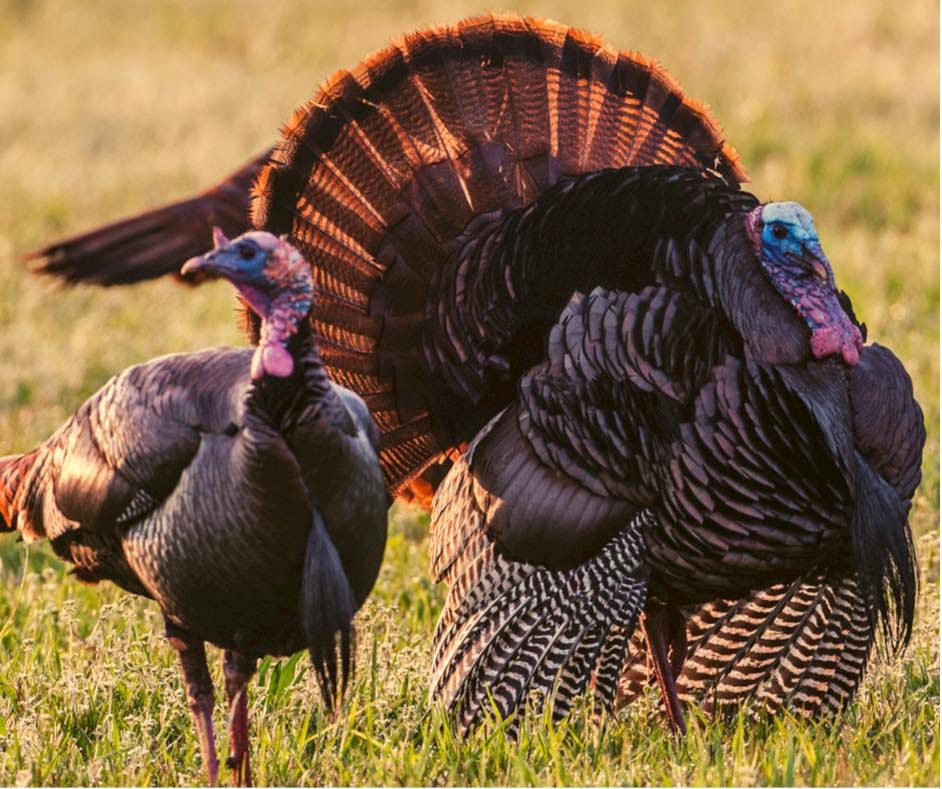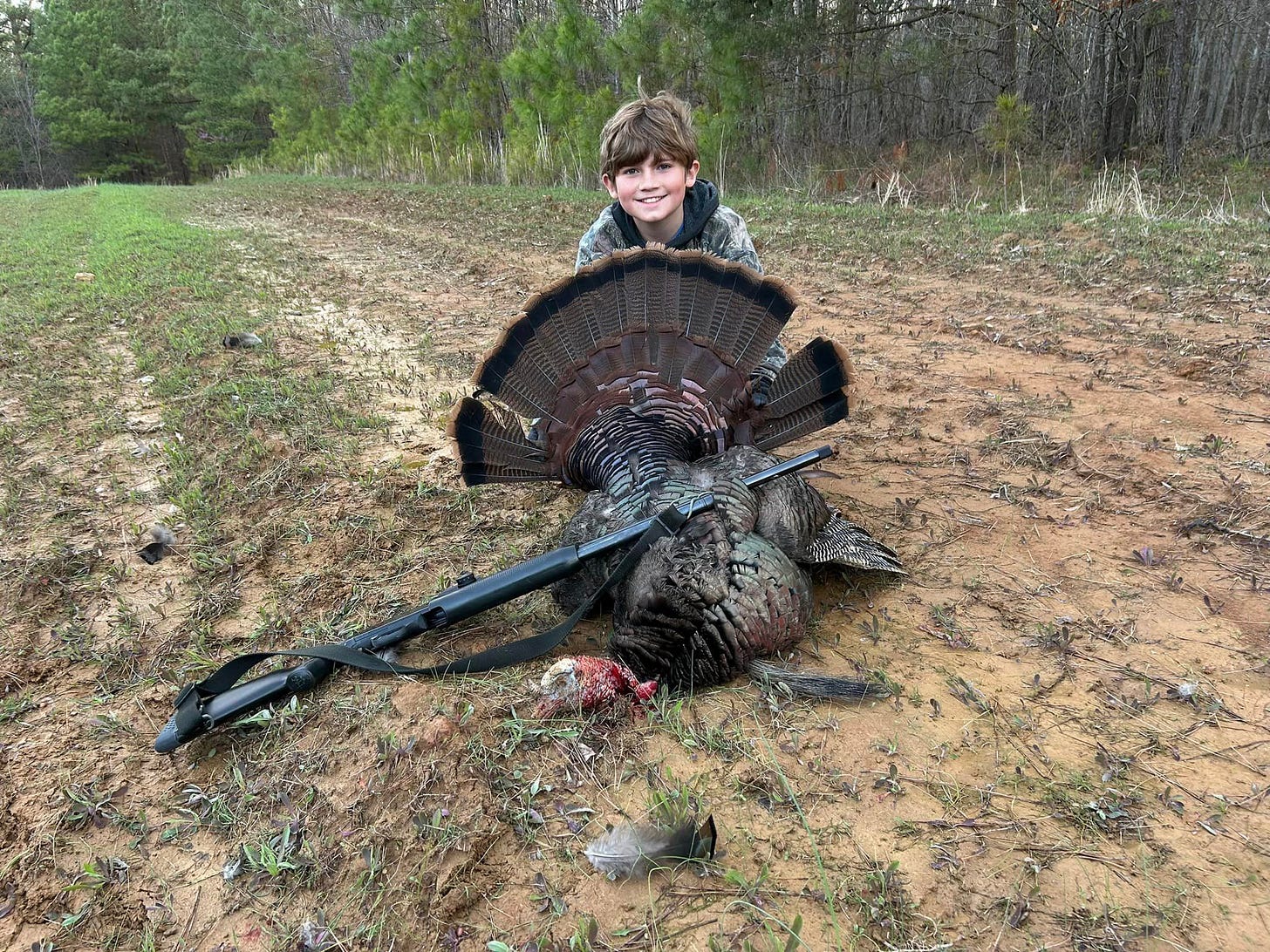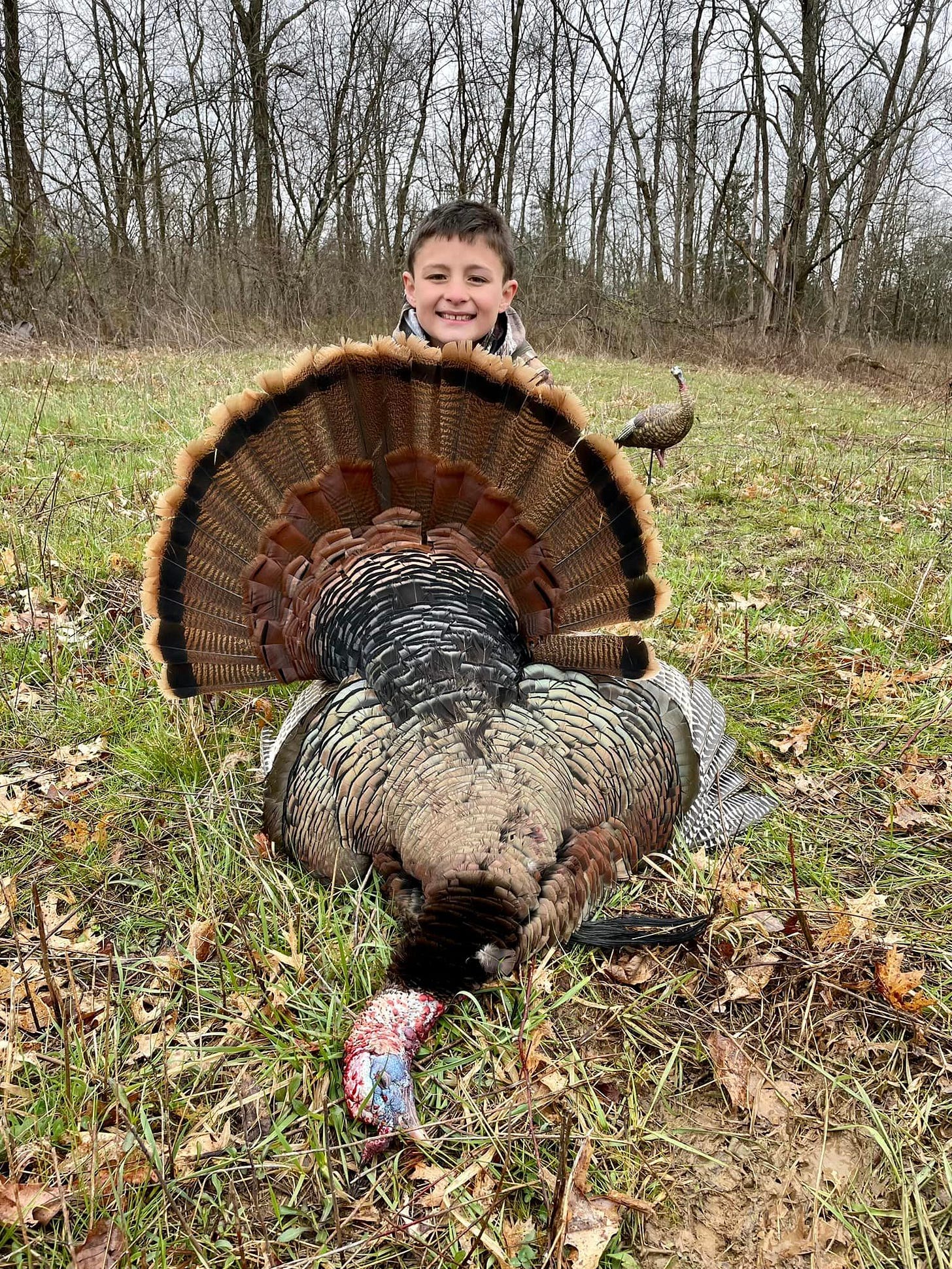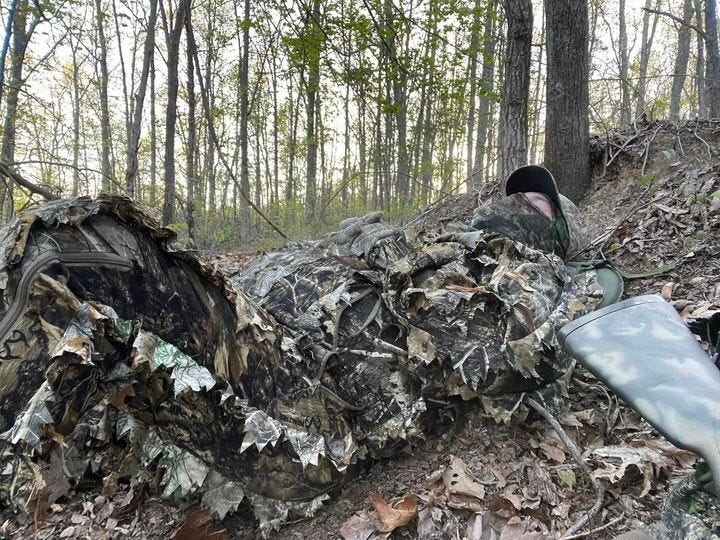Who is ready for this?
Credit to Nathan Spears on TikTok
Stop Making These Turkey Hunting Mistakes
Written by Mike Collins
All turkey hunters have been outsmarted by wily gobblers at some point in their hunting career. More often than not, it’s because mistakes were made during the hunt.
The adage “we learn from our mistakes” may be old hat, but the saying rings true in the turkey woods. After identifying the mistake that was made you learn from it and you don’t make the same mistake again. Calling to gobblers on the roost, calling too aggressively, setting up too far, walking and calling, staying home in inclement weather, one-dimensional calling and quitting are all mistakes that can ruin a turkey hunt.
Calling To Gobblers on the Roost
Calling gobblers on the roost is an easy mistake to make when you are hearing booming gobbles echo around the property. It’s hard to resist when they are gobbling their brains off.
A gobbler will stay on the roost longer if you call to him. He may continue to gobble, but he will be expecting the hen to come to him. If he stays in the tree longer it will open up the opportunity for hens to come into the area and pull him away from your set up.
Slip into the area quietly and set up while he’s gobbling on the roost. Start calling softly when the bird hits the ground. You can even attempt to mimic the sounds of a hen flying down from the roost by slapping your hat on your leg. Don’t start calling to a gobbler on the roost, if you do you could end your hunt before it begins.
Setting Up Too Far
Setting up too far from the roost site or major strut zone is another mistake that many hunters make. Setting up 60 or 70 yards from the fly down is not a good idea unless you are hunting birds that are roosted by the edge of a field.
Get into the 40-yard range when hunting a bird still on the limb. When the bird flies down, yelp a few times to get his attention. There is a good chance you will be the first hen he thinks is on the ground and he will move in to check it out. If you are in that 40-yard range the gobbler will only have to come in five to 10 more yards for you to be able to get a shot.
If you set up too far you’re giving hens the chance to slip in and steal the gobbler away from you. Don’t be passive with your set ups, get as close as you can without busting birds.
Calling Too Much
Calls are some of the most important tools that hunters can use to help close the deal on a longbeard. It is very easy to get carried away with calls, especially when a gobbler is hung up out of range with his hens.
Calling too much can really mess up the hunt and it educates birds. If the woods are quiet and you aren’t hearing gobbles you don’t want to be burning it up with your calls. Your calling needs to be natural, if there is a lot of gobbling and yelping going on in the woods, you can be aggressive with your calling. Do as the birds do, if you do the opposite you chances of killing a gobbler decreases.
Lack of Calls in the Arsenal
Many hunters make the mistake of going turkey hunting with just one call. You handcuff yourself tremendously if you only utilize one call when turkey hunting.
Gobblers respond to different sounds each day. One day a gobbler might respond to a diaphragm call that produces a raspy hen sound. The next day that same gobbler could ignore a raspy hen call, and instead respond better to a high-pitched box call.
Make sure you carry several different calls in your turkey vest. Always have a box call, slate call, diaphragm call or a push-pin call so you can try different calls if one isn’t getting the job done. Be versatile. Using multiple calls every so often can also give the illusion that there are several hens in an area. Highly effective tactic when hunting late morning gobblers. Those birds will leave their morning hens to search for new hens to hook up with. Put a single hen decoy out in a strut zone, that gobbler will come in on a string.
Walking and Calling
Walking and calling can be a mistake because you run the risk of bumping birds and attracting other hunters. When gobblers commit to calling they tend to get tight-lipped. If they don’t gobble and they are coming toward you, you aren’t going to know it. If you are still walking and calling you will spook the gobbler and it will ruin your hunt.
Walking and calling can be dangerous if other hunters are in the area. You are walking around while producing the sounds that other hunters are listening for. When you are trying to locate a bird stop, call and wait 30 minutes before you move on. If you don’t strike up a gobble move to another area and repeat.
Staying Home in Inclement Weather
When rain is in the forecast some hunters elect to stay at home rather than hit the turkey woods. This is a monumental mistake. Turkeys will go to open fields when it rains, or after a hard rain. You know where you need to set up on turkeys when it rains.
Turkeys do not like to be in the woods when it rains because it is noisy and it makes it hard for them to see. Turkeys feel vulnerable to predators, so they make their way to the fields. Put on a rain suit, grab a blind and get after them.
Hunters see rain and decide that their chance for success has dropped because of bad weather. Hunting in the rain can pay huge dividends, and if you are out there anything can happen. You can’t shoot a turkey sitting inside the house.
Quitting Because They Aren’t Gobbling
If you are serious about turkey hunting, quitting is not in your vocabulary. You’re telling me you’d rather fish because the turkeys aren’t gobbling? Get out of here! There is no way I’m letting my friends leave the woods. A lot of hunters leave the woods when the turkeys get quiet. Huge mistake. The birds haven’t disappeared, they just stopped talking.
Get in a strut zone and hang out for a little while. Put out a few hen decoys and call softly every 30 minutes, maybe on the hour get out a box call and let out sequence of yelps in case you need sound to carry. Don’t be in a rush to move. Even if one does happen to fire up close by, call again and see if he answers, more than likely he’s coming. Be patient.
Calling every 30 to 45 minutes will keep you from overcalling. Stick to this because it’s part of the tactic. You are calling just enough to tell a gobbler off in the distance where you are. The gap between call sequences is going to make him want to come find you. When he does, your decoy setup of one hen is going to align with what he’s looking for. He’ll strut and put on a show all the way to where he’s behind the bead on your gun barrel. Don’t give up, be patient.
These are mistakes that all hunters have made before. Now that the mistakes have been identified you can learn to avoid them. Don’t let a gobbler outwit you this spring.
Watch Billy Barnett and Turkey Hunting USA complete his Grand Slam!
Take a Kid Hunting This Turkey Season
The youth turkey hunting weekend kicks off Saturday April 6, 2024 in Kentucky. Children ages 15 and younger will be hitting the turkey woods with an adult mentor in hopes of bagging a big old Eastern gobbler.
Taking youth hunting can be somewhat challenging when you feel the pressure to make a good impression on them. If you are like me, you want your kids to enjoy it as much as we do. I’ve had to take a step back. I’ve learned that it is more important to focus on comfort and enjoyment of the hunt rather than filling a tag. If you are taking a youth hunter out this weekend, here are a few things to consider.
First and foremost, discuss and review gun safety with your youth hunter. Hopefully in target practice you have already talked about the safe ways to hold and handle a firearm. The two-handed or ready carry, the cradle carry, trail carry, elbow side carry, shoulder carry and sling carry are all safe ways to carry a firearm. Review these positions and talk about the importance of target identification. Show them the safety button on the firearm and go over when it would be time to turn the safety to fire position.
Make It Fun
The worst thing you can do is force a child to go hunting if they don’t want to go. It is important to avoid pressuring them into hunting as hard as you do. Let the youth hunter take ownership of the situation. Don’t force them to stay longer than they want to stay, even if it means leaving the woods during prime time.
Legendary turkey hunter and call maker, Harold Knight likes to take the youth hunters he hunts with to the store to pick out snacks and drinks for the blind. It’s another way to allow that youth hunter to have control over the situation. It also generates the excitement of picking out snacks for a special occasion. Having snacks in the blind is a great way to help pass the time while waiting for a turkey to appear. You don’t want your youth hunter getting hungry.
While in the field, talk about the different plants and animals you see together. Discuss food sources for each of the animals you observe and where those animals might go to rest.
Let the youth hunter bring some games into the blind. Maybe they bring coloring books or something to read. They can play games, color or read books to help pass the time.
Be patient with your youth hunter. Kids squirm and make noise. It is going to happen at some point during your hunt. Don’t get mad at them. Turn it into a teaching moment. Explain scenarios when it might be okay to move or make noise.
Set Ups
Set up in known strutting zones. Birds will frequent these strut zones often and it will help increase your chances of a gobbler coming in. Hunt from a blind. Put a blind in the middle of the strut zone and take some comfortable camping chairs to sit in. As mentioned before, kids are going to squirm and move, the blind can help hide some of their movements. Pace 20 yards from blind and put out some decoys. Decoys serve a few purposes here. Decoys can help lure gobblers into shooting range, and they distract gobblers from noticing potential movement in the blind. If a gobbler does come into your setup, you’re in for a real show. It will be something that youth hunter will never forget.
Participation
Encourage participation. Let your youth hunter help set up the blind or set out decoys. Once you are in the blind and ready to hunt, let your youth hunter use some calls. It is a priceless moment to see their smiling face when they use a call and get a response from a gobbler. This will help the youth hunter build confidence in the field.
Good camo goes a long way in turkey season…
If it’s a slow morning, put on your best leafy suit and take a nap!










Awesome stuff!! This will be something I go back and read the night before turkey season!
Thanks for this post. One of my goals this spring is to turkey hunt more! I've done it a little in the past, but would like to get into more and this post has some good advice on how to approach it.